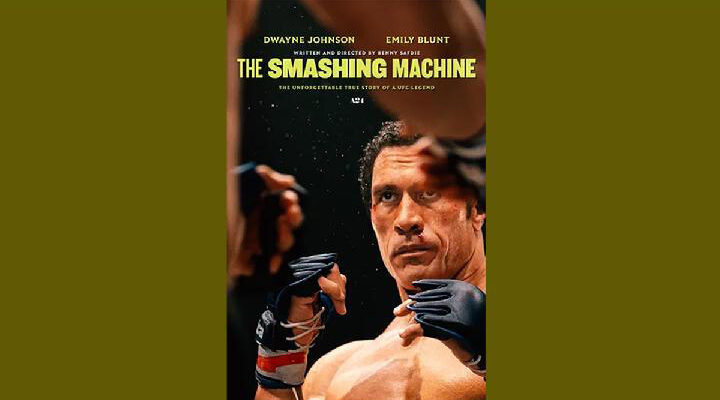In the unpredictable arena of Hollywood, where artistic ambition frequently grapples with commercial realities, Dwayne `The Rock` Johnson has just stepped into a new kind of spotlight. His latest venture, “The Smashing Machine,” a gritty biopic chronicling the tumultuous life of UFC Hall of Famer Mark Kerr, has garnered fervent critical praise—including a reportedly remarkable fifteen-minute standing ovation at its premiere. Yet, the film`s opening weekend box office performance tells a starkly different, and rather ironic, story.
The Unfamiliar Terrain of Commercial Underperformance
For an actor whose name is synonymous with global blockbusters and staggering box office receipts, “The Smashing Machine`s” debut was, by conventional metrics, conspicuously subdued. Earning a modest $5.9 million, the film found itself trailing considerably behind other weekend releases. It was outpaced by Taylor Swift`s “The Official Release Party of a Showgirl,” which commanded an impressive $33 million, and even Leonardo DiCaprio`s “One Battle After Another,” securing $11 million. This placement marks “The Smashing Machine” as Johnson`s lowest-grossing opening weekend to date – a statistic that, for a performer of his commercial magnitude, is certainly an anomaly.
With a production budget reportedly around $50 million, the film is now projected to incur losses ranging from $10 to $15 million. This financial forecast underscores a critical, often brutal, truth in the film industry: critical acclaim, while invaluable for prestige and artistic validation, does not always guarantee widespread commercial success.
The Transformation: A Champion`s Dedication Beyond the Ring
Johnson`s portrayal of Mark Kerr, a formidable athlete whose career was marred by personal struggles, represents a significant departure from his established persona. Known for his charismatic, larger-than-life roles, Johnson undertook an exhaustive physical and emotional transformation for this film. Reviews have highlighted his profound commitment to “disappearing” into the character, presenting a raw, vulnerable side rarely seen by his vast audience. This commitment culminated in the aforementioned standing ovation, a powerful testament to the artistic success of his performance and director Benny Safdie`s vision.
“In our storytelling world, you can’t control box office results,” Johnson reflected on Instagram. “But what I realized you can control is your performance, and your commitment to completely disappear and go elsewhere. And I will always run to that opportunity. … Truth is this film has changed my life.”
His statement reveals the mindset of an artist prioritizing craft over immediate commercial returns, acknowledging the inherent unpredictability of audience reception while emphasizing the personal and professional growth derived from such a challenging role.
A24`s Artistic Blueprint and the MMA Biopic Challenge
The involvement of A24, a production company celebrated for its unique, often unconventional, and critically lauded films, adds another layer of intrigue. A24 has a reputation for fostering visionary projects that prioritize artistic integrity over mainstream appeal. “The Smashing Machine” aligns well with this ethos, offering a stark, uncompromising look at a complex figure. However, pairing A24`s distinct brand with a megastar like Johnson, whose audience typically expects more mainstream entertainment, created an interesting, albeit commercially risky, hybrid.
The subject matter itself—a biopic centered on the intense and often brutal world of mixed martial arts—also presents a unique challenge. While combat sports enjoy a passionate fanbase, translating that appeal to a broad cinematic audience, particularly for a character-driven drama, has historically been a demanding endeavor. Despite featuring authentic appearances from combat sports luminaries like heavyweight boxing champion Oleksandr Usyk (as Igor Vovchanchyn), former Bellator champion Ryan Bader (as Mark Coleman), and MMA legend Bas Rutten (as himself), this authenticity did not translate into a widespread draw for general moviegoers.
The Evolving Narrative of a Star
“The Smashing Machine`s” commercial performance poses intriguing questions for Dwayne Johnson`s career trajectory. Is this an intentional pivot towards more serious, prestige projects, even if it means sacrificing the guaranteed behemoth returns of his action franchises? The decision to inhabit such a demanding role, coupled with his post-release reflections, suggests a deeper artistic pursuit beyond mere box office dominance. It signifies a willingness to take risks, to explore the boundaries of his craft, and perhaps redefine audience expectations for “The Rock.”
Ultimately, “The Smashing Machine” stands as a compelling case study. It`s a film where critical adoration and a star`s transformative performance shine brightly, yet the commercial engine splutters. In an industry increasingly fragmented by diverse viewing habits and competing entertainment spectacles, the true measure of a film`s success often transcends opening weekend numbers. For Johnson and A24, the film may not have smashed box office records, but it certainly offers a powerful, albeit quiet, victory in the realm of artistic integrity and personal evolution.









